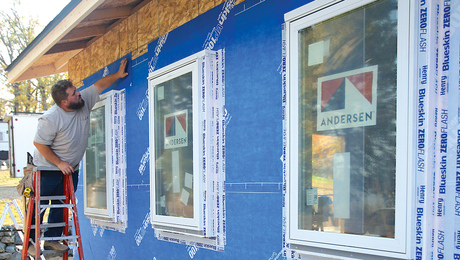I’m redoing electricals as part of replacing bedroom ceiling. Are there are any smoke detectors that are particularly recommended? I can just go to Cheapo and get a piece of crap, but I’d rather do it right. I’m assuming these things need a box (see, that’s how ignorant I am….).
Thanks for any help.




















Replies
Are you talking hard wired ones, or just the typical standalone units?
With the single units, I'd suggest geting one with a 10 year battery. That way you don't have to remember to change the batteries.
If you're talking hard wired ones, yes they need a box.
With hard wired ones, I'd suggest staying away from the ones with battery backups. If one of the units with a battery goes bad, there's no way to shut them off. They keep going off until you pull the batteries from every last one of the units.
Since I'm rewiring, I want to take the opportunity to put in a hard-wired detector.
I put Kidde 1275's in this house and our last one also. They are hard wired with battery backup, and are interconnected. I use metal electrical boxes and install a two gang box with a round fixture ring as the rough-in.
I ran 12/3 romex between the units, because all the circuits here are 20 amp, but you can run 14/3 if you're on a 15 amp circuit. You only need to run two-wire to the first unit, then go three-wire from there. You should run that two-wire feed from a lighting circuit that is used daily--do not put the smokies on their own circuit. That way, if the lights are not working you will know that there is a problem with the circuit.
They have 9v batteries in them. If a battery dies, that unit will chirp about every 3 minutes. If the circuit is shut off, they all chirp, maybe every 30-60 seconds. If all hell breaks loose I can use my wife's pantry stepladder and have all of the units down off the ceiling in about 60 seconds... they twist-lock to their mounting rings, and have modular connectors that you can easily disconnect. Piece o' cake. I have done this once... we had a scheduled outage for line upgrades, about 8 hours, and I took the units down for the day.
I'm a volunteer firefighter and know that smoke detectors save lives every day. We had a fire about 2 weeks ago where an elderly woman was saved from dying in her bed... by our fire captain... who broke in and took her out. She had smoke detectors but never changed the batteries. A local school here was inspected recently by the fire marshal and he found that all the smoke detector batteries had been taken by the kids for their ipods or gameboys or whatever.
I just installed some standalone battery units and notices that they now have a finger that the battery holds down.If you take the battery out the finger keeps you from reinstalling the smoke.Looks like a good idea.
The Kidde units have the same finger, held down if a battery is in place. I actually have no idea what happens if there's no battery but you put the unit on the ceiling. When I get off my arse I'd get the ladder and find out. It'll probably set off the whole chain.
Thanks to everyone, this has been very helpful.Looks like the Kidde P12000 is the one to get, combines ionization and photoelectric. Let's see that price tag, heh heh....Have been thinking of pricing out sprinklers. Thinking about foam insulation in the attic, already have it in the bathroom, these old houses don't provide much egress in their windows....And roger that on attic heat detector....Thanks again.
The manufacturer of the smoke detectors you select should be able to recommend a heat detector, actually termed a heat rise detector if I remember right, that will work on the same circuit as their smoke detectors and how to connect it. Making all the units sound off.
There are two different heat detectors.Absolute tempature sensors and rate of rise sensors.
good thread, 3 things, 1) you don't usually want ionization/photoelectric combo units everywhere, check the literature each sensor has it's strenghtes, one is better for kitchens (less nusance allarms and therefore they are less likely to be disconected) 2) carbon-monoxide sensors outside sleeping areas are now required in our area (combo CO & smoke are available) 3), all units are required to be interconected ... good point on the attic location!!
I have the kidde hardwired detectors, they are fine, but I wish I had gotten the ones that are adjustable? that can be used by kitchens and avoid false alarms while cooking.
I don't have the lowdown, check out their website, that's where I read about them.
Not entirely unironically, given the name, the majority of smoke detectors, the cheaper ionization type, are not very good at actually detecting smoke. These are great at detecting the byproducts of an open flame in a room but not the suffocating smoke of a smoldering fire. The sort of situation when the fire is very advanced and the room actively involved.
There is another method commonly seen in smoke detectors, the photodetector. These photodetector units are less sensitive to the ionized byproducts of an open flame but much more sensitive to a smoldering and smoky fire type of fire most common in residential fires, at least in the beginning phases when an alarm does the most good.
Neither type of detector, used alone, will give you the best protection. Consider spending a little more for a few photodetector units to add to the mix so that you have all the bases covered. If the type isn't clear on the product package look on the back. The ionization units will have a radiological registration and warning, a wise requirement from the NRC, as the process uses a small radiation source. The source isn't a worry but it tells you what method the unit uses to detect a fire.
To limit the number of units you need to buy and the clutter on the ceiling consider some of the dual method units. These use both methods but you pay a premium for these units.
While your at it consider installing a heat detector, a more delicate and complicated smoke detector likely wouldn't survive the use, in the attic and wired into the smoke detector circuit. I don't have the recommended heat setting handy but I think it is something like 190F. If the attic gets above this set point it can be assumed something is on fire.
An undetected fire in the attic is particularly troublesome as it can grow and spread for a considerable time undetected by the occupants before moving down. Common in these cases is that, if the family gets out at all, it is only because a neighbor saw the fire from outside the house in time for the family to get out or the firemen to rescue them.
Some have suggested a heat detector in the garage instead of a smoke detector. Something to think about.
You might want to talk to the local fire department for recommendations. Don't be surprised if the installation of a sprinkler system comes up. IMHO a wise investment. And far cheaper than most assume. Combine a competent selection of detectors with a sprinkler system and your about as well covered as you can get short of living in a firehouse and having a 24/7 fire watch.
Do you know of any of the chained smokes that have an indicator on them that indicates when THAT PARTICULAR ONE triggers the alarm?Seen too many complaints where people have had a false alarm, but had to end up unplugging all of them trying to find the problem.
I'm unaware of any that includes an indicator telling from which unit the alarm originates. This is common in integrated commercial fire alarm, smoke detection, water flow systems and would seem to be a good idea for residential units.Sounds like you have a product improvement patent coming for the idea. Even something as simple as a distinctive blink on the power LED would help greatly.I'm thinking a button on each unit that would silence, for perhaps a minute, all the answering alarms while the originating unit continues to sound off. This would also help in the case of an actual fire. And certainly help differentiate the false alarms from the real emergencies. In addition to helping troubleshoot the alarm system. Likely the most common use.
There is at least one brand that does, but it doesn't seem to be all that practical in the real world.A friend of mine had a problem where all of the smoke detectors (7)in her house went off. She and the fire department didn't realize that they were all tied together. They turned off breakers, pulled the battery out of the burglar alarm system and finally ended up taking all of the smoke alarms down.My friend doesn't have the money to pay an electrician, so she calls me to help. I find that one of the detectors is malfunctioning and causing the others to all go off as well. We leave the bad one out of the circuit in a location that wasn't that critical.Then, we find the directions for the smoke alarms that tell you what the blinking LED on the unit means. One thing that it does is to tell you which alarm went off. But, this was four days after she called the fire department and went through all this hassle.
Here I am idly flicking through this thread, and after reading this post, I just wanted to take a minute to thank you for your always worthwhile comments.Over time, after reading through a lot of threads, I have learned to pay particular attention to a handful of people. Your thoughts are always level-headed, clear, and informative.You're one of the reasons I keep coming back to BT -- to learn stuff I don't know, or to think about stuff I do know in a different way.********************************************************
"I tend to live in the past because most of my life is there."
-- Herb Caen (1916-1997)
Thank-you.